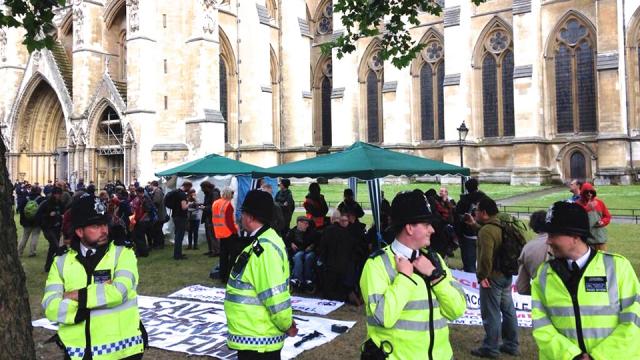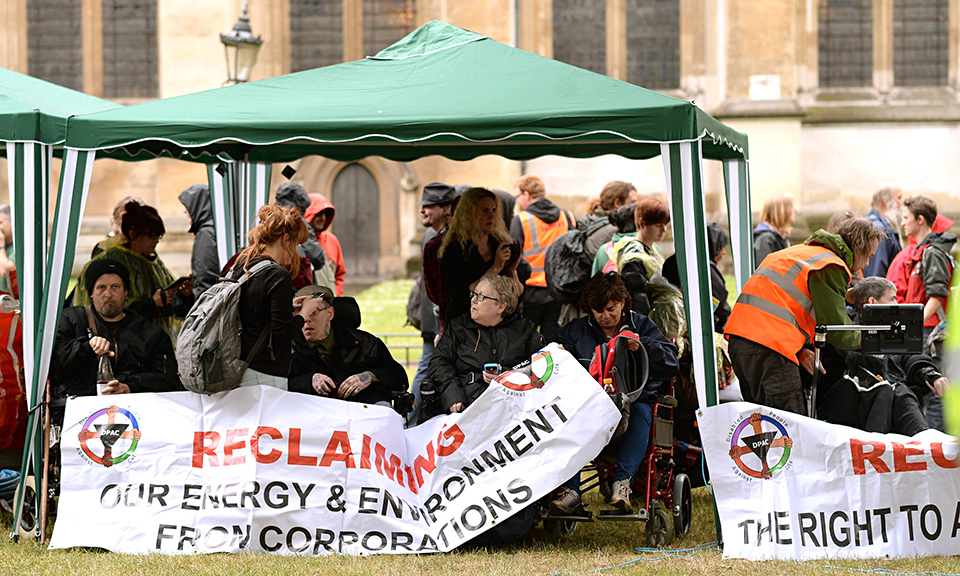
At 3:45 last Saturday afternoon, over 40 people, many of them wheelchair users, locked themselves to the gates at Westminster Abbey. A truckload of tents and camping equipment had already been brought onto the green. Disabled People Against Cuts (DPAC), facilitated by Occupy London and UK Uncut, planned to set up a three-week camp on the space less than a water cannon’s reach of the Houses of Parliament.
The camp aimed to challenge the U.K. government’s decision to cut the Independent Living Fund – support that for 25 years has granted severely disabled people autonomy. This is the first ever attempted protest camp led for and by people with severe impairments.
“The Independent Living Fund (ILF) means people can be in their community, and do the same things other non-disabled people can do,” said Paula Peters who participated in Saturday's effort to occupy Westminster.
“This fund means people can life a live, go to work, meet their friends, socialize. Without the ILF people will either be imprisoned at home or forced into residential care.”
The ILF has enabled disabled people to engage fully as active members of society since 1988, with 17,500 current recipients across the UK. In December of 2012, the government announced it would terminate the fund as of April 2015.
That decision was successfully challenged in the Court of Appeal, where a judge ruled that the government could not end the ILF because it would remove people’s rights to independent life. But the U.K. government restated that it would ignore the legal decision and cut the ILF.
Describing the way in which government is advocating cuts against disabled people, Peters added: “They say it is too expensive to pay for disabled people. They describe us as scroungers, fraudsters and work-shy to spread propaganda: that we should all be working.”
She pointed to statistics showing that benefits fraud is actually miniscule – far less than unclaimed benefits, and a drop in the ocean in comparison to rampant corporate tax evasion in the U.K..
“But what the public need to realize is that the welfare state is a safety net," Peters continued. "It is there for when you fall on hard times, and for people like us. We would give anything to be able to work and live like everybody else does, but we cannot.”
By 4pm, there were five gazebos and two pop-up tents erected on the site. Police prevented larger tents from being put up in the form of a Tent City University – including a tech tent and other structures - by climbing over the fence and rushing the encampment. Authorities outnumbered the over 100 activists who had turned out, with estimates reaching as high as 300 officers – many participating with riot gear.
The British coalition government’s growing rhetoric against disabled people has been linked to rising hate-crimes against people with impairments. The tactic also fits a broader demonization of minorities and vulnerable groups, which is explained in Guy Standing’s [Precariat Charter] (http://www.occupy.com/article/recognition-representation-redistribution-...).
Standing points out that people who are pushing for and benefiting from an austerity agenda are dividing the masses, turning anger away from the super rich to instead blame workers, students, immigrants or the disabled.
Martin, another DPAC member, told me that disabled people are losing both in disabled-specific benefits and through other means-tested poverty support, such as the bedroom tax.
“Disabled people are hit nine times harder than able people, whereas severely disabled people are being hit 19 times more. We are getting cut again and again,” he said.
By 6pm on Saturday there was still no response from the Dean of Westminster, as police awaited the decision whether or not to evict protesters who had set up a toilet tent and a food tent.
Immediately when the occupation began, a letter had been sent not only to the Dean but to a supportive Member of Parliament, John McDonnell, in an attempt to open dialogue.
I asked McDonnell, who was standing on the outside of the spiked fence, to explain his version of the situation.
“DPAC and the other activists wanted someone to talk to the Dean about allowing the camp to stay. So far he has been resistant to that," McDonnell said. "He is now in service – praying, I take it.”
The MP continued: “I have been told he will be out at 6:15, so I have left him my number and asked if he could call me to begin a dialogue with the people with disabilities.”
As it became less and less likely that the Dean would speak to the disability activists, I asked another DPAC member, Andy Greene, to comment.
“I’m very disappointed that the Dean has not been able to find it within himself to facilitate this process," Greene said, "considering that it was a time-limited peaceful protest and considering how this involves so many disabled people, who find the situation so striking that they are willing to put their liberty and health on the line.”
I asked McDonnell why he thought that camp was necessary:
“Because we have tried everything else. There has been debate after debate in Parliament, including one initiated by a petition of over 100,000 people, but nothing happens. So what else can people do apart from direct action?” he said.
The Dean eventually refused to speak to the camp and, outnumbered heavily by police, the activists were forced to leave. McDonnell was not alone in criticizing Parliament's hypocritical stance regarding aid to the disabled.
“While the MPs get an 11% pay rise, nurses get 1% and everyone else is getting cut back," said Martin. "The only ones not getting cut back are those in that [Parliament] building over there.”
He added: “This government [does] not care. Disabled people are literally starving to death. It’s cut after cut. The only people who are not suffering are the MPs – they get a £300 a month food allowance, and there are people in this country who get paid so badly that they still have to depend on benefits and food banks as the cost of living is going through the roof.”
Greene asserted that the government’s plans for cuts to the disabled also profit corporations.
“Private healthcare providers are taking over care home provision. It is about stacking the people high: the least provision for the lowest cost. This involves people like Care UK, BUPA health and so on, making a mint at disabled people’s expense,” he added.
Greene warned of the stark reality if the Independent Living Fund is cut. “Living in one of these care homes means you don’t run your own life," he said, and "you might be in your own piss and shit for days.” Worse still for many, it would mean the equivalent of a death sentence. He mentioned a study conducted by the private healthcare provider BUPA.
“They did this study when they were looking to increase their care home provision. Over 50% of disabled people who went in died," continued Greene. "That is residential homes, not nursing homes, where people are supposed to live, but end up dying.”
3 WAYS TO SHOW YOUR SUPPORT
- Log in to post comments












